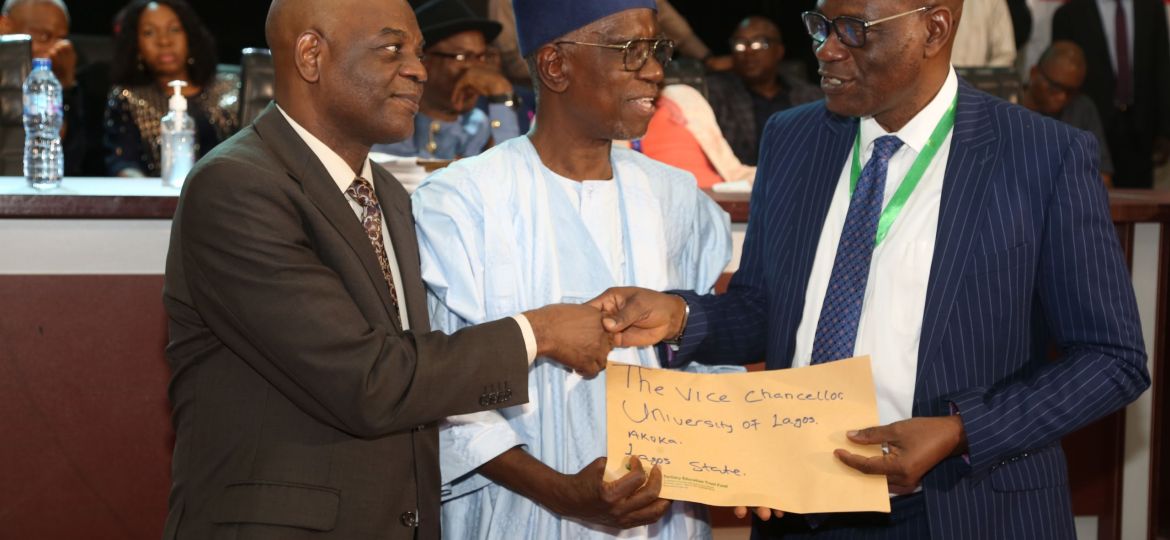
The Tertiary Education Trust Fund (TETFund) has kicked off the year 2022 Intervention Programme with the distribution of Allocation letters to the 244 Beneficiary Institutions across the country, following the approval of President Muhammadu Buhari.
Each University got a total of N642,848,138.00, the sum of N396,780,086.00 is allocated to each Polytechnic, while every College of Education got N447,758,804.00 according to the ratio of 2:1:1 stipulated by the TETFund’s operational mandate.
Distributing the Allocation letters at a Strategic Interactive Session for Heads of TETFund Beneficiary Institutions (BIs), held at the National Universities Commission (NUC), Abuja, the Executive Secretary of TETFund, Arc. Sonny Echono explained that the allocation is in line with the guidelines of the various intervention lines.
Arc. Echono advocated for more synergy between the Fund and Heads of BIs, stating that the job of sustaining the development of tertiary education sector is a collective one and needs all hands to be on deck to achieve the desired goals.
The Executive Secretary said, “The enormous task of repositioning the tertiary education sector for the sustained relevance is a collective one and requires that we work in harmony and synergy to achieve the desired national objective of meeting our human capital needs through a robust and high-quality tertiary education sector. This synergy, which he pointed out, is the aggregation of multiple resources that provide greater value, cooperation and teamwork that requires that we bring on board our collective experiences and expertise towards finding solutions to specific national problems and goals”.
He expressed worries over the rising cases of non-performing or distressed projects across the institutions, stating that the issue would be a thing of the past as plans are in progress to set up mechanisms that would bring a permanent solution.
Echono noted that to some extent, some of these issues escalated because of the Fund’s policy on guidelines for assessment of Intervention funds, while some beneficiary institutions have their own share of the blame, assuring that necessary reviews would be embarked upon to reverse the trend.
The Executive Secretary pointed out that the Management of the Fund had further taken a decision to remove policies that cause delays in project implementation by eliminating the compulsory Internal Audit Clearance on submissions to access second tranche payment, where there is a final tranche outstanding.
This phenomenon, Arc Echono reiterated, “becomes even more worrisome, when viewed alongside the problem of un-accessed funds. We are mindful of the intricate variables in project management and delivery, as well as the constraints created by our own internal policies, and we are in the process of reviewing our processes where required but will also demand from beneficiary institutions accountability and give appropriate sanctions where needed.
Furthermore, the Executive Secretary resolved that the Fund would beam the light on the disturbing case of Academic Publishing Centers (APC), that are yet to take off, despite having been given all the necessary resources in terms of funding, capacity building as well as ‘Strategic Framework and Establishment Guideline’ developed by TETFund for the Centers.
He emphasized that in the coming weeks, he will be engaging beneficiary institutions who have these serious problems with the objective of bringing the projects to speedy completion and use.
The Executive Secretary was optimistic that after the planned review of the implementation policy of the Centers, they would be in better stead to perform optimally.
On the recent partnership with Forum for Agricultural Research in Africa (FARA) and a consortium of nearly 40 Universities in Brazil to provide world-class, multi-disciplinary, tuition free Masters and PhD degree programmes for Nigerian scholars, he stated, will aid collaboration that will in turn boost food security, science, and technology-driven innovation as well as entrepreneurship and employability of Nigerian graduates.
Arc. Echono re-emphasized his commitment to build on the successes of his predecessors in the critical areas such as Research and Development, Innovation and Entrepreneurship Education.
He also pointed out that one of the Fund’s primary areas of focus is digital literacy, development and deployment of Information and Communication Technology (ICT) to Beneficiary Institutions.
To fast-track institutions’ ICT connectivity, he disclosed that his recent visit to the Minister of Communication and Digital Economy, Professor Ali Isa Pantami was to discuss possibilities and collaboration on interventions and other needs of public tertiary institutions.
The Executive Secretary added that reviews by the Agency would continue to unfold in few months to come, with a view to improving TETFund’s processes and to deliver high quality services that would meet the expectations of stakeholders as well as deliver the Fund’s mandate.
The interactive session elicited a lot of questions from Heads of Beneficiary Institutions, some of which answers were provided to clear grey areas, while a few were set to be cleared at a scheduled meeting with the Management of TETFund.
There were goodwill messages from the Permanent Secretary of the Federal Ministry of Education, Mr. Andrew David Adejo, Executive Secretary of the Nigerian Universities Commission (NUC), Professor Abubakar Adamu Rasheed, Executive Secretary of National Commission for Colleges of Education (NCCE), Prof. Paulinus Okwelle, lauding Arc. Echono for his drive and commitment to improving the standard of tertiary education in the country.
`

